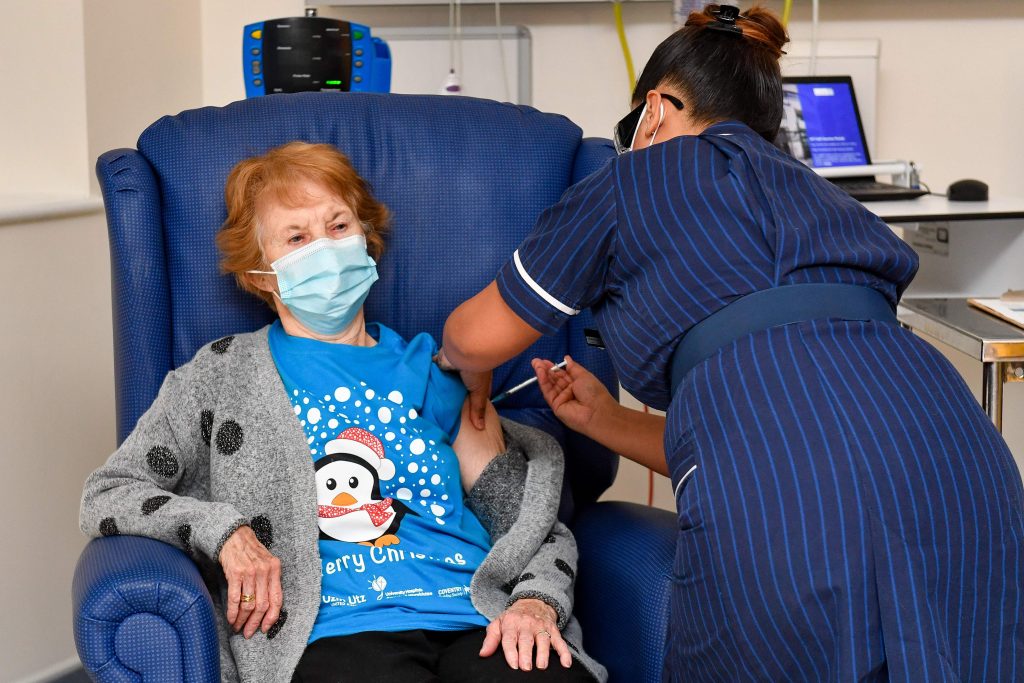
LONDON: Britain became the first Western country to start a mass coronavirus vaccine campaign yesterday with a 90-year-old receiving the initial jab, as the number of cases in Europe hit 20 million. Kicking off Britain's "V-Day", Margaret Keenan said she felt "privileged" to be given the injection, the first of millions expected to be administered in the hard-hit country over the coming months.
The Pfizer-BioNTech jab is one of several vaccines bringing hope for an end to the pandemic that has killed more than 1.5 million people worldwide and ravaged economies. "My advice to anyone offered the vaccine is to take it," said Keenan, wearing a mask and a penguin T-shirt. "If I can have it at 90 then you can have it too."
The UK's second jab reportedly went to a man named William Shakespeare. The over-80s, care home workers, and at-risk health and social care staff will be at the front of the line. Almost 40 percent of the new cases detected over the last seven days worldwide have been in Europe, the region topping 20 million cases yesterday. But the rate of infection appears to be stabilizing.
Russia, one of Europe's hardest-hit countries in terms of cases, began vaccinating high-risk workers with its own jab on Saturday, and Beijing has also begun an emergency inoculation campaign with a medicine made in China. The United States is expected to grant emergency authorization for the Pfizer-BioNTech vaccine later this week, announcing yesterday that no concerns had been found in trial data.
Despite the vaccination news, curbs continue to be reimposed - roughly 30 million people in the US state of California are now under stay-at-home orders. And the World Health Organization has warned that successful vaccines on their own will not immediately end the crisis. America's floundering efforts to quell the pandemic have been widely criticized - the nation is the world's worst-hit with more than 283,000 deaths.
Even as hopes rise for vaccines and a resulting economic recovery, governments are being forced to tighten restrictions to contain surges in infections. German Chancellor Angela Merkel urged regions with high coronavirus rates to tighten curbs, while Denmark said it will close middle and high schools, bars, cafes and restaurants in half of the country. - AFP

![TOPSHOT - CORRECTION - Nurse May Parsons (R) administers the Pfizer/BioNtech Covid-19 vaccine to Margaret Keenan (L), 90, at University Hospital in Coventry, central England, on December 8, 2020 making Keenan the first person to receive the vaccine in the country's biggest ever immunisation programme. - Britain on December 8 hailed a turning point in the fight against the coronavirus pandemic, as it begins the biggest vaccination programme in the country's history with a new Covid-19 jab. (Photo by Jacob King / POOL / AFP) / The erroneous mention[s] appearing in the metadata of this photo by Jacob King has been modified in AFP systems in the following manner: Pictures were taken on [December 8, 2020] instead of [December 9, 2020]. Please immediately remove the erroneous mention[s] from all your online services and delete it (them) from your servers. If you have been authorized by AFP to distribute it (them) to third parties, please ensure that the same actions are carried out by them. Failure to promptly comply with these instructions will entail liability on your part for any continued or post notification usage. Therefore we thank you very much for all your attention and prompt action. We are sorry for the inconvenience this notification may cause and remain at your disposal for any further information you may require.](https://kuwaittimes.com/uploads/imported_images/uploads/2020/12/headline2-2.jpg)








